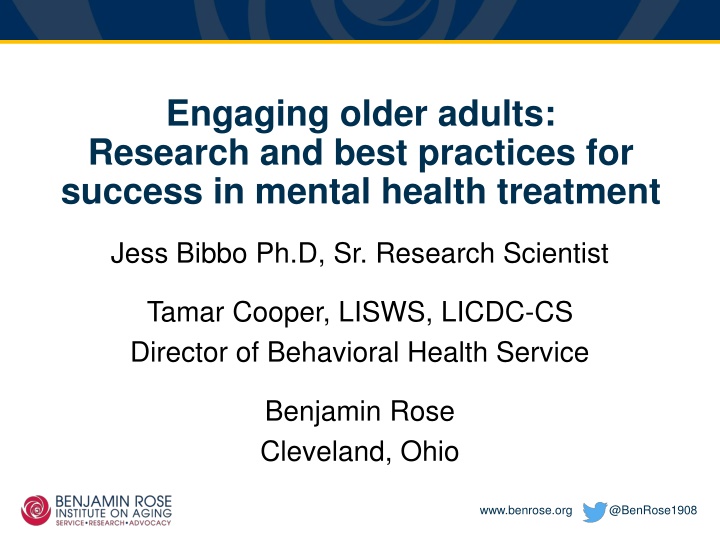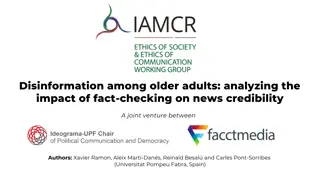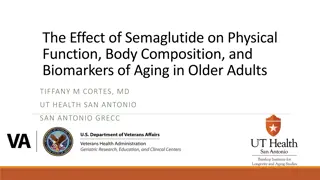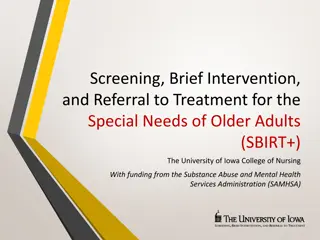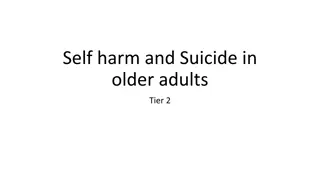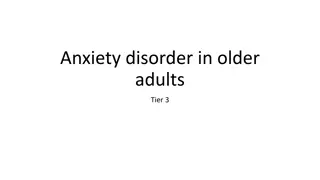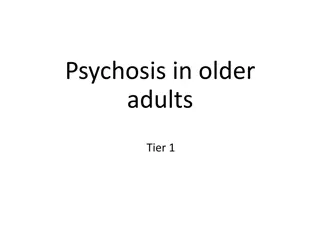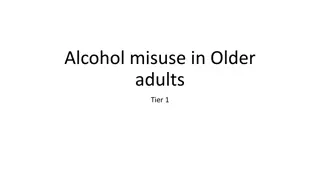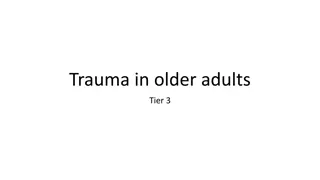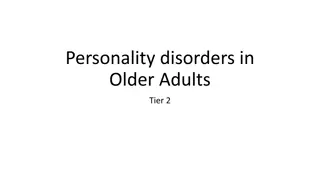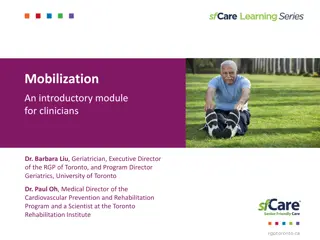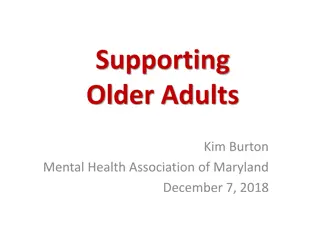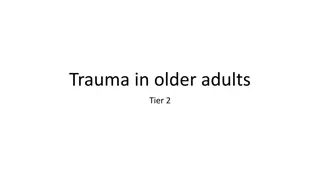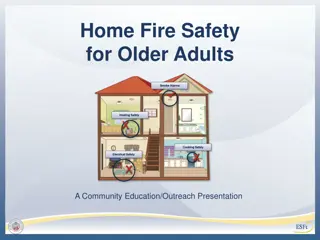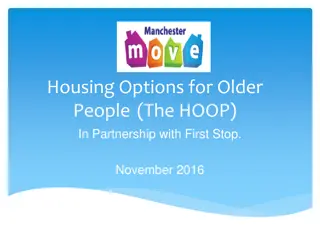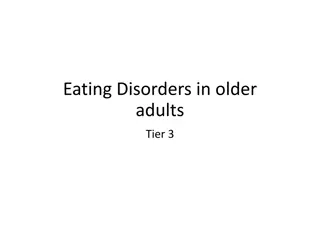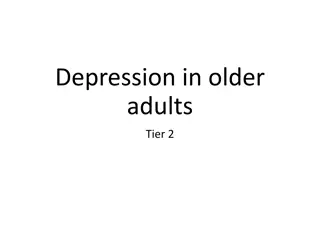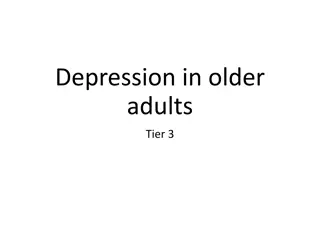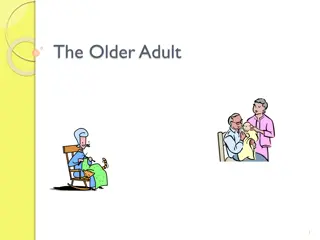Engaging Older Adults: Best Practices in Mental Health Treatment
Research and best practices for successful mental health treatment in older adults are explored by experts from Benjamin Rose in Cleveland, Ohio. The organization offers a range of services including mental health case management, counseling, caregiver support programs, and staff trained in addressing issues specific to aging populations. Attendees of their programs can gain insights into challenges and strengths of aging, as well as learn techniques for effective treatment.
Download Presentation

Please find below an Image/Link to download the presentation.
The content on the website is provided AS IS for your information and personal use only. It may not be sold, licensed, or shared on other websites without obtaining consent from the author.If you encounter any issues during the download, it is possible that the publisher has removed the file from their server.
You are allowed to download the files provided on this website for personal or commercial use, subject to the condition that they are used lawfully. All files are the property of their respective owners.
The content on the website is provided AS IS for your information and personal use only. It may not be sold, licensed, or shared on other websites without obtaining consent from the author.
E N D
Presentation Transcript
Engaging older adults: Research and best practices for success in mental health treatment Jess Bibbo Ph.D, Sr. Research Scientist Tamar Cooper, LISWS, LICDC-CS Director of Behavioral Health Service Benjamin Rose Cleveland, Ohio www.benrose.org @BenRose1908
Benjamin Rose Founded in 1908 Benjamin Rose is an over 110-year old Cleveland-based nonprofit organization whose mission is to support caregivers and empower all people to age well through research, consumer-responsive services and client advocacy. We work on the cutting edge of the aging experience, aiming always to inspire and enlighten. www.benrose.org @BenRose1908
Benjamin Rose Behavioral Health Services Health and Wellness Services Home-delivered Meals Senior Centers Financial Wellness Affordable & Supportive Housing Evidence-based Caregiver Support Programs www.benrose.org @BenRose1908
Behavioral Health Services Mental health case management, CARF-certified mental health day treatment; counseling and psychotherapy; diagnostic and evaluation- all offered either in person or telehealth. Offer ongoing presentations on variety of mental health topics to both professionals, caregivers, public on issues related to aging Staff trained in providing Mental Health First Aid through state funded Mental Health America www.benrose.org @BenRose1908
Behavioral Health Services Trained staff in the field of aging, cutting edge issues that impact older adult. Cyber romance scams, hoarding, grief and loss, linkage and education, partners with senior housing, suicide and the older adult. Our success: Older adults have a lifetime of experience. Sharing that with someone who often times is half their age is difficult. Staff remembering to validate and respect the person where they are at is the key to building a foundation for treatment. www.benrose.org @BenRose1908
Center for Research & Education Established in 1961 Conducts research projects and develops evidence-based practices to benefit older adults, their families, and service providers. Specialty areas Active Aging Family Caregiving Elder Abuse Program Evaluation Consumer Satisfaction Long-term and Residential Care Services & Interventions www.benrose.org @BenRose1908
Learning Objectives Attendees will be able to identify specific challenges and strengths of aging. Attendees will be able to describe techniques to engage and build rapport with older adults. Attendees will be able to recognize signs of cognitive impairment. Attendees will be able to describe the importance of research on mental health services for older adults. www.benrose.org @BenRose1908
Brutus Buckeye turns 59 in 2024 Between 2020 and 2024 Ohio s population of those 60 and older is expected to grow more than 4x the state s overall population, including a 51% increase in the portion of Ohioans 85 and older It s more important than ever that community social workers, therapists, and other professionals should have the knowledge on how to work with this older population! www.benrose.org @BenRose1908
An Aging Population www.benrose.org @BenRose1908
Is 60 really the new 30? Engaging and keeping older adults in mental health treatment The first meeting sets the tone for the relationship Importance of cultural and age-related sensitivity from the first introduction. Respect: Ask how the person would like to be referred to Ms., Mr., etc. Cultural, generational norms and beliefs Awareness of older adult's feelings and stigma of mental illness www.benrose.org @BenRose1908
Is 60 really the new 30? Engaging and keeping older adults in mental health treatment Older adults come into treatment with more life experience and tend to have more medical, physical, psychosocial issues. They will age which brings on more challenges. Professionals must be more than just generalists to adequately address the mental health and social needs for this fast growing population in Ohio. www.benrose.org @BenRose1908
Addressing the Mental Health Needs of Older Adults Hybrid approach-community based visits combined with telehealth; meeting client needs based on a comprehensive assessment. Breaking down assessment; ease for client not clinician. Cultural sensitivity Values, environment, acceptance, respect you are a guest in their home/life Cutting edge issues that impact older adults cyber romance scams, hoarding, linkage and education, partner with senior housing. Education re: grief and loss, alliance with major agencies, service providers and other social service providers Normalizing aging Linkage with other service providers. www.benrose.org @BenRose1908
httpshttps://www.nia.nih.gnfographics www.nia.nih.gov/health/infographics/understanding-different-types-dementia www.benrose.org @BenRose1908
Importance of Early Diagnosis https://www.imi-neuronet.org/materials/ www.benrose.org @BenRose1908
Depression in Older Adulthood At increased risk Often misdiagnosed Undertreated May not seek help More successful at suicide Silent suicide Can be successfully treated Physical health impact www.benrose.org @BenRose1908
Substance Abuse Bodies process substances differently as we age Impact of prescription Rx Understudied Older adults do respond to treatment https://www.nytimes.com/2023/07/09/health/seniors-substance-abuse.html www.benrose.org @BenRose1908
Telephone- and email-based care-coaching program that assists and supports adults with or at-risk for developing dementia, including those with intellectual and developmental disabilities, and their family and friend caregivers, or other supports. www.benrose.org @BenRose1908
A personal Care Consultant helps with: Finding and getting connected to health and community services Prioritizing concerns using a simple step-by-step plan based on YOUR needs Communicating with loved ones, family, and friends about care and managing difficult situations and behaviors Staying in touch with individuals and families so adjustments can be made as situations change Assisting with getting other family and friends involved Being there for YOU as an emotional support when overwhelmed or faced with challenges www.benrose.org @BenRose1908
5 SHARE sessions + 6th optional Family Session for SHARE Partners the person living with dementia and a family care partner. SHARE Sessions are held weekly, lasting 60-90 minutes. www.benrose.org @BenRose1908
Support Guide Resource Create a safe environment for care partners to share their points of view. Answer questions about dementia and available resources. Help - problem-solve through difficult decisions. Assist - determine if what they plan is realistic. Help them communicate more effectively. Build - connection to services (support groups, early stage programs, etc). Guide - towards decisions that are mutually acceptable. Provide support and validate their feelings and experience. Help - understand that they are not on this journey alone. www.benrose.org @BenRose1908
An Aging Population www.benrose.org @BenRose1908
An Aging Population www.benrose.org @BenRose1908
Thank You Jess Bibbo, PhD jbibbo@benrose.org Tamar Cooper, LISWS, LICDC-CS tcooper@benrose.org www.benrose.org @BenRose1908
